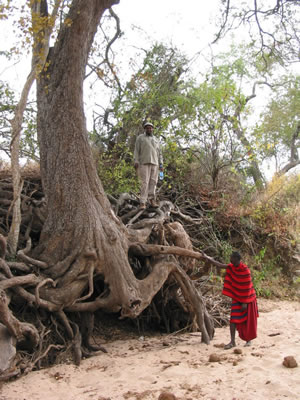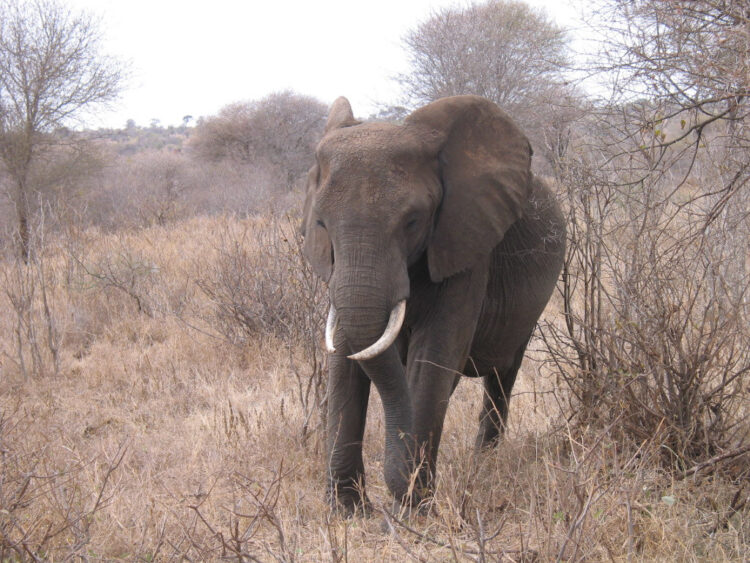My son and I arrived at the Tarangire Treetops Safari Camp in the late afternoon. A day of safari through the Tarangire National Park had put us face to face with lions, elephants, baboons and a number of gazellelike creatures of varying types. It had been a terrific first day of exploring Tanzania’s Northern Circuit, and we were eager to see firsthand the camp we had heard so much about. As the Range Rover stopped, several Maasai tribesmen approached our vehicle. Without a word, they removed our bags and walked toward the camp. Hoping they were employees, I followed.
 In the reception area, a large open platform with a thatch roof, I signed the registration and one of the more interesting waivers I have ever seen at a lodge property: “Guest acknowledges that the possibility exists of encounters with poisonous snakes, scorpions, elephants, lions and other wild animals and hereby releases and holds harmless…”
In the reception area, a large open platform with a thatch roof, I signed the registration and one of the more interesting waivers I have ever seen at a lodge property: “Guest acknowledges that the possibility exists of encounters with poisonous snakes, scorpions, elephants, lions and other wild animals and hereby releases and holds harmless…”
Tarangire Treetops is a tented camp, but with a difference. The tents are sturdy, permanent structures built alongside the many trees on the property. Wooden steps lead from the ground to the entrance of each tent. On the interior, a large bed, an open shower, and panoramic views of the countryside make the tent about as welcome an accommodation as I have ever experienced. We had gone to the Tarangire to see lions and elephants up close, without the crowds of the Ngorongoro Crater. The Tarangire is one of Tanzania’s best-kept secrets, often overlooked as safari-seeking tourists rush to the Serengeti from Arusha. We had been told for up-close encounters with elephants, Tarangire could not be matched.
The sun had set by the time we finished a dinner of beef and rice at the camp kitchen. One of the staff indicated a Maasai would escort us along the dark quarter-mile trek from the kitchen to our tent. From the edge of the shadows, a young Maasai dressed in a red blanket and sporting a rather large knife beckoned for us to follow. He directed us to our tree tent and as he left us, he used sign language and the words “no leave” in English to indicate that we should remain in the tent until morning. “Tembo … simba,” he said, the Swahili words for elephant and lion. Convinced, we zipped the flaps of the tent and retired for the night.
Early the next day, the same Maasai, whose name we learned was Tito, stood at the foot of our tent stairs as we descended from the tree. “Tembo,”
he repeated and pointed at the bush. I looked but could see nothing through the thicket. He eyeballed my camera warily. Knowing that many Maasai did not like to have their pictures taken, I waived my hand over the lens and repeated “Tembo”. The look on Tito’s face remained impassive.
As my son and I rounded the trail to the camp’s dining facilities, there stood a large bull elephant, drinking from a pool of water just beyond where we would have breakfast.
 The sight of an African elephant is truly awesome. Twelve thousand pounds of mammal put together in such a way as to leave no doubt who is truly the king of the jungle. No other beast confronts an elephant, and all give way. The day before, we had watched as a pride of lions calmly ceded their places under the shade of a large baobab tree to a bull elephant. As my son and I ate breakfast, the elephant placidly continued to drink and forage on nearby trees. After finishing our bacon and eggs, we were ready for a day’s hike through the brush with a Maasai guide. My son decided to wait and watch the elephant as I headed back to the tent to retrieve our gear. Our escort was nowhere to be seen. Seeing that the camp elephant was occupied in the opposite distance, I impatiently decided to head back on my own, wanting to get a quick start on the day. I left my son at the dining platform and began the walk up the trail to our tent.
The sight of an African elephant is truly awesome. Twelve thousand pounds of mammal put together in such a way as to leave no doubt who is truly the king of the jungle. No other beast confronts an elephant, and all give way. The day before, we had watched as a pride of lions calmly ceded their places under the shade of a large baobab tree to a bull elephant. As my son and I ate breakfast, the elephant placidly continued to drink and forage on nearby trees. After finishing our bacon and eggs, we were ready for a day’s hike through the brush with a Maasai guide. My son decided to wait and watch the elephant as I headed back to the tent to retrieve our gear. Our escort was nowhere to be seen. Seeing that the camp elephant was occupied in the opposite distance, I impatiently decided to head back on my own, wanting to get a quick start on the day. I left my son at the dining platform and began the walk up the trail to our tent.
As I turned a bend in the path, I heard a noise off in the bush to my left. Just ahead, through the thorn trees and low scrub, not more than 20 feet away, a large bull elephant stared intently at me. I had approached him far too quietly and now found myself suddenly closer to the real Africa than I had intended.
Just prior to the moment an elephant charges — just before you realize that you are about to run as you have never run before and right after the animal visually locks in on you — just before your mind can adjust to the reality of the moment — there is a fleeting second of self-reprimand: you know you have screwed up in a rather significant manner. Nature is no longer “out there” but is staring at you in the form of a six-ton animal whose sole intent is to wipe his feet on your back. You try to remember the rules … drop and play dead … right? Right?
Contrary to myth, your life does not pass before your eyes. There simply isn’t time. It’s flight or fight time, and fighting is pretty much out of the question. The elephant’s ears flared, it raised its trunk and trumpeted.
It charged.
I turned and ran.
 I ran for all I was worth. Behind, I could hear the elephant gaining on me. Before me, 10 feet away, were the stairs to the first tent on the path. Without touching the first two steps, I bounded up as quickly as my short 56-year-old legs would carry me. The elephant came to a stop at the bottom of the stairs and snorted. He glared at me and turned. At the edge of the path, he grabbed the railing of a small wooden fence, ripped it from the ground and tossed it a dozen feet, frustrated at having lost his opportunity to bounce me down the trail in a similar manner. My heart was racing wildly. Safe, I could not believe that I had barely missed a trip back to the States in a shoe box.
I ran for all I was worth. Behind, I could hear the elephant gaining on me. Before me, 10 feet away, were the stairs to the first tent on the path. Without touching the first two steps, I bounded up as quickly as my short 56-year-old legs would carry me. The elephant came to a stop at the bottom of the stairs and snorted. He glared at me and turned. At the edge of the path, he grabbed the railing of a small wooden fence, ripped it from the ground and tossed it a dozen feet, frustrated at having lost his opportunity to bounce me down the trail in a similar manner. My heart was racing wildly. Safe, I could not believe that I had barely missed a trip back to the States in a shoe box.
From the camp, I could hear the concerned calls of the staff. I yelled that I was OK, but that I might need an escort back to the dining area. Several Maasai began to berate the elephant, tossing sticks and rocks at its hindquarters to drive it from the area. By this time, however, humans no longer intimidated the elephant. He left at his own leisurely pace, leaving a repentant and somewhat wiser me watching from my tent in a tree. It was a while before I tired of the view and descended the stairs.
They say an elephant never forgets.
Neither will I.


